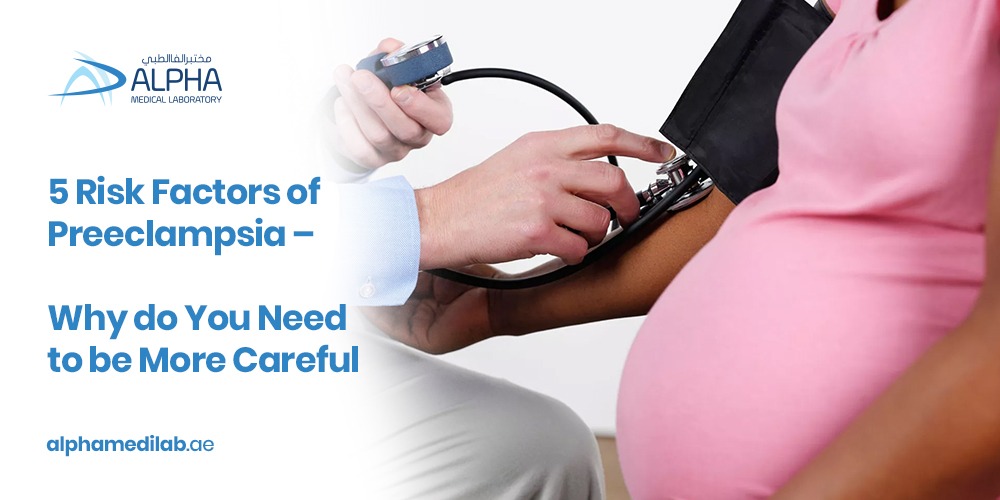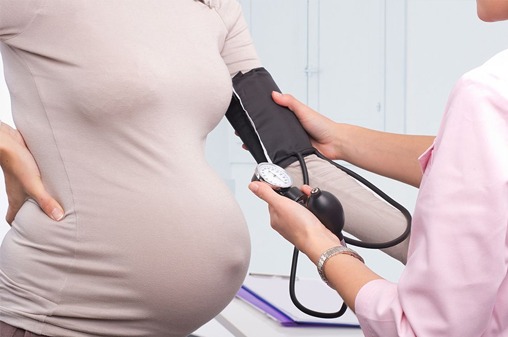
Preeclampsia happens because of a new onset of high blood pressure. It may occur because of protein in the urine, during pregnancy, or after delivery. Another reason for preeclampsia can be a deficient level of platelets, the blood cells that help in blood clotting or indicate improper liver or kidney functioning.
There are different parameters of risk factors that come with preeclampsia. It is important to take care of preeclampsia as the elevated risk factors of preeclampsia might lead to preterm birth, low birth rate, or even stillbirth. No matter if you’ve taken a non-invasive prenatal test (NIPT), if you have higher symptoms of preeclampsia, you should consult your doctor before delay.
In some cases, preeclampsia also leads to the disturbed health of mothers and, in some, to death. The rate of preeclampsia infection is not low, and the pregnancies with preeclampsia are a considerable. Therefore, understanding the risk factors associated with preeclampsia becomes imperative so that you can take timely measures and start treatment for having a safe birth and ensure well-being of the child and mother.
Understanding Preeclampsia
Preeclampsia occurs because of gestational hypertension, which means that it only happens during or after pregnancy. The symptoms of preeclampsia are mild to severe, which can elevate the chances of both mother and fetus.
High blood pressure, swelling, water retention, and increased protein levels in the urine, which I also termed proteinuria, are a few of preeclampsia’s symptoms and happenings.
However, some conditions require immediate medical attention. It includes fatigue, sensitivity, shortness of breath, vomiting, severe headache, low urine output, blurred vision, etc.
The happening of preeclampsia isn’t precise. However, many potential reasons cause preeclampsia, including genetic factors, autoimmune disorders, blood vessel problems, pregnancy of over 40, and multiple pregnancies.
Risk Factors of Preeclampsia in Pregnancy
Numerous research has identified the preeclampsia risk factors that pregnant women should be aware of. Your obstetrician can suggest the best preventative measures and treatments after knowing about these issues.
Additionally, it improves your chances of avoiding preeclampsia altogether. With this being said, here the following are some of the most important preeclampsia risk factors you need to be aware of:
1. Diabetes
Diabetes is another elevated risk that can happen because of preeclampsia. According to a study being published, people who have diabetes issues as at high risk of developing chronic blood pressure twice as high as those without diabetes. It turns out that elevated blood sugar levels might harm the arteries, and as a result, they are more prone to stiffening, which can lead to high blood pressure and heart disease.
So, women diagnosed with diabetes before pregnancy is at risk of preeclampsia, and a similar case happens with those with gestational diabetes. Hence, physicians focus on checking blood sugar levels through a plasma blood test.
2. Gestation Hypertension
If you have chronic high blood pressure before pregnancy, you may be at an elevated risk of preeclampsia because gestation hypertension is one of the leading reasons for preeclampsia. Similarly, women who have previously encountered preeclampsia may also develop hypertension issues in future pregnancies.
Moreover, it also leads to chronic hypertension after pregnancy, even in mothers who haven’t had preeclampsia before. This can also become a reason for cardiovascular diseases.
3. Kidney Disease
Another disease or high risk that preeclampsia can lead to is a kidney disease which eventually becomes a chronic illness. When kidney disease happens because of preeclampsia, it disturbs and disrupts renal function, driving to a slow or affected blood flow. And this also becomes a major source of high blood pressure and other serious cardiovascular diseases.
Kidney health is essential, and looking after it becomes mandatory. Some lab tests are conducted for pregnant women to check for chronic kidney disease. The need for getting laboratory tests becomes essential as ignoring the need for the test may lead to endangering the lives of both mother and the fetus. For example, pregnant women with kidney issues immediately asked for a creatinine blood test. Getting this and sharing the reports with your physician will help them evaluate the mother-to-be’s condition for kidney-related illnesses.
4. Autoimmune Disorder
Another reason for pregnancy complications can be due to autoimmune disorders, which can also be from preeclampsia. When we say autoimmune disorder, it includes systemic lupus erythematosus (SLE), which happens because of impairing immune responses wherein the immune system attacks the healthy cells in your blood.
Having an immune disorder directly impacts fetal gestation during pregnancy, leading to inflammation that affects blood pressure and also surges the risk of preeclampsia.
5. Polycystic Ovary Syndrome
Polycystic ovary syndrome is another disease that affects women during pregnancy. It becomes a hindering factor during pregnancy, as women who develop the condition of POS must be extra cautious about preeclampsia.
According to some studies, polycystic ovary syndrome has become a significant factor for preeclampsia and also elevates the chances of miscarriage. Moreover, women with polycystic ovary syndrome should also be careful about heart diseases.
5 Tips to Reduce the Risk of Preeclampsia
The impact of preeclampsia is real; therefore, it is important to take timely and important measures to save yourself from its adverse effects. Here are some of the essential ways in which you can reduce the risk of preeclampsia.
- The foremost thing to do is to attend your scheduled prenatal testing and checkups. This is one way that tells about the health of the mother and baby.
- Being vigilant and careful about blood pressure is also essential. Because hypertension increases in preeclampsia and hence checking for your blood pressure becomes mandatory.
- Another element to consider and evaluate is your weight. Getting yourself checked for weight is important if you are overweight, as letting it go might trigger hypertension.
- Maintaining a little physical routine is necessary.
- Craving for different food items during pregnancy becomes evident. However, if you refrain from consuming more salty foods, you are also saving yourself from the triggering factors of hypertension that will eventually add to preeclampsia.
The Final Takeaway
Whether you are presently pregnant or expecting pregnancy at some time, women should be aware of preeclampsia and the risks associated with it. The problems of this disorder may significantly impact the physical health of the mother and fetus.
However, it could also cause long-lasting psychological suffering in women. Therefore, it is important to take timely blood tests or pregnancy tests so that timely treatments and medications can be given to save your life.

